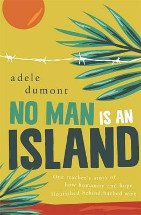No man is an island by Adele Dumont

Hachette, 2016. ISBN 9780733636370
(Age: 16+) Highly recommended. Adele Dumont was one of those eager
young people who answered the call to volunteer for a month at the
Christmas Island detention camp teaching English to refugees.
Finding the joy in teaching such enthusiastic resilient learners
despite their desperate circumstances, she goes from there to gain
employment as a teacher with Serco, giving English classes at the
Curtin detention centre in Derby, WA, for two years. The book No
man is an island is drawn from her experiences recorded in her
personal journals throughout her time there.
I felt completely drawn into her story of the warm relationships and
deep respect that builds between her and the Afghani men who call
her 'My teacher, my teacher'. She becomes someone in between the
'us' of the 'officers' and the 'them' of the 'clients'. She forms
genuine friendships and builds trust. The classes become a highlight
in the days that easily lose meaning in the interminable wait for
some kind of response to the men's applications for refugee status.
The camp is barren, set in a harsh unwelcoming landscape, and the
lives of the refugee men are on hold, not knowing when they will get
a case interview, how it will be decided, and what that will mean
afterwards. It is the interminable waiting and sense of hopelessness
that gradually takes its toll, with the glazing over of the faces,
the self-harm and suicide. Dumont herself starts to share the same
feeling of loss and fear. She describes the disorientation and loss
of identity she feels when she gets to go to the 'outside'. She at
least has that break away, the men 'inside' have no reprieve. They
are held in indefinite detention.
It is a very cruel system and one that all Australians should know
about - it is what our government, our country, is doing to
dehumanise and destroy people who just are seeking safety and a new
future. Dumont's book doesn't argue a case, it is not political in
the way that Chasing
Asylum by Eva Orner (2016) is, it just
quietly draws the reader into that world hidden away from our eyes,
so that we feel what Dumont felt, and gain some insight into the
harm that is being done.
Helen Eddy